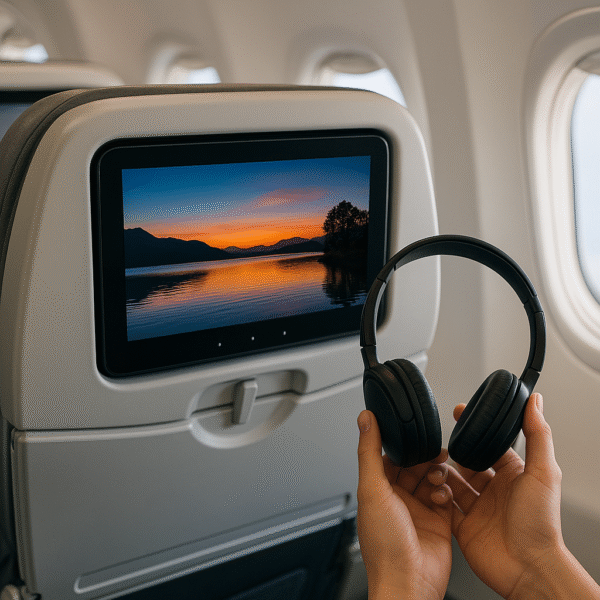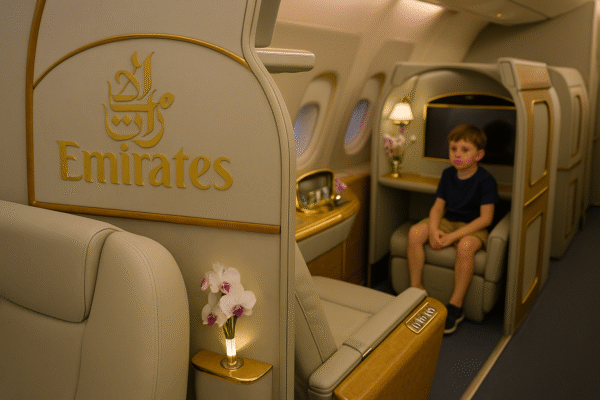Emirates Airlines, one of the world’s most prestigious carriers and a symbol of luxury aviation, has recently updated its Skywards loyalty program. The airline has announced a new restriction: children under the age of nine are no longer eligible to redeem miles for first-class tickets. While the rule does not prevent parents from purchasing cash tickets for their young children in first class, it does stop them from using accumulated loyalty rewards for these seats.
The move has sparked debate across the travel industry. Families who frequently rely on loyalty points to enhance their travel experience are particularly concerned. Meanwhile, business travelers and other frequent flyers have expressed mixed reactions, with some welcoming the change and others calling it unfair.
Why the Policy Was Introduced
Emirates has not issued a detailed explanation, but the reasoning appears tied to the airline’s vision of exclusivity in its premium cabins. First-class seating, often regarded as the pinnacle of air travel, includes luxury suites, fine dining, and a tranquil environment. Restricting young children from redeeming loyalty points for these seats may be an effort to maintain the serene atmosphere many passengers expect when booking first class.
At the same time, Emirates seems to be restructuring its loyalty offerings to align with evolving customer segments. Skywards remains a competitive rewards program, but the policy shift raises questions about whether airlines should make premium cabins more inclusive for families or preserve them as havens for quiet luxury.
Impact on Families and Frequent Flyers
For families, the new rule presents a clear challenge. Many travelers with children save up miles specifically to enjoy a premium travel experience without bearing the high costs of first-class tickets. Now, those with younger children must either purchase seats with cash or opt for business class when redeeming rewards.
This change affects not just families but also business travelers who fly with dependents. A parent traveling for work who uses loyalty miles for a family trip may now need to reconsider their plans.
On the other hand, some frequent flyers support the restriction, arguing that first-class service is best enjoyed in a quiet, adult-oriented environment. They feel that the move enhances the value of premium seating, ensuring that passengers who pay or redeem for first class receive the tranquility they anticipate.
Divided Opinions: Should Kids Be in First Class?
The debate extends beyond loyalty program rules into a broader conversation about children in first-class cabins. Supporters of the new rule believe that children, especially younger ones, may not always align with the luxury, rest, and exclusivity associated with premium cabins.
However, critics argue that behavior, not age, should define suitability for first-class travel. Many point out that children can be calm and respectful passengers, while disruptive behavior is not exclusive to younger travelers. Parents also emphasize that they invest the same effort and loyalty into the airline as other customers and should enjoy equal access to rewards.
The conversation highlights a growing tension in the aviation industry: balancing exclusivity with inclusivity, especially as families increasingly travel together in premium cabins.
Alternatives Available for Families
While Emirates’ new rule affects first-class redemptions, families still have several options:
- Business Class Redemptions – Miles can still be redeemed for business class, which offers high comfort, lie-flat seats, and premium services suitable for family travel.
- Cash Purchases – Families determined to fly in first class with younger children can still purchase tickets outright, although this comes at a significant cost.
- Exploring Other Airlines – Competing carriers may provide more flexible policies for families. Airlines such as Singapore Airlines, Qatar Airways, and others often market family-friendly features, including dedicated seating or tailored amenities for young travelers.
- Tier Upgrades in Skywards – Achieving higher membership tiers in the Skywards program could provide additional flexibility and benefits, even if the first-class restriction remains in place.
How Families Can Adapt
Travelers affected by this change can take proactive steps to manage their plans:
- Review Skywards Accounts: Families should revisit their reward balances and upcoming bookings to understand how the new rules affect them.
- Consider Business Class: Business class may provide an ideal balance of comfort and accessibility for families with children.
- Budget for Cash Purchases: For special occasions, some families may still choose to buy first-class tickets outright.
- Research Competing Programs: A careful comparison of loyalty schemes from different airlines could ensure families continue to maximize their travel experiences.
Broader Implications for Tourism and Travel
This policy shift underscores a growing trend in the aviation sector: airlines are refining loyalty programs to target specific customer segments while emphasizing exclusivity in premium travel. As global tourism recovers, competition between airlines is intensifying.
Families represent a significant portion of travelers, and how airlines cater to their needs will shape brand loyalty in the long run. Some industry experts suggest that Emirates could eventually introduce family-friendly premium products, such as separate cabin zones or enhanced business class services designed for parents and children.
Conclusion: A New Era for Premium Family Travel
Emirates Airlines’ decision to bar children under nine from redeeming loyalty miles for first-class seats has stirred both support and criticism. While the airline seeks to protect the exclusivity of its premium cabins, the move challenges families to reconsider how they use loyalty points and plan luxury travel.
As the debate continues, one thing is clear: the future of premium travel will involve balancing exclusivity with inclusivity. Families, frequent flyers, and airlines alike will need to adapt to these evolving expectations. For now, Emirates remains firm on its stance, leaving families to navigate new strategies for enjoying high-end air travel.
For more travel news like this, keep reading Global Travel Wire












